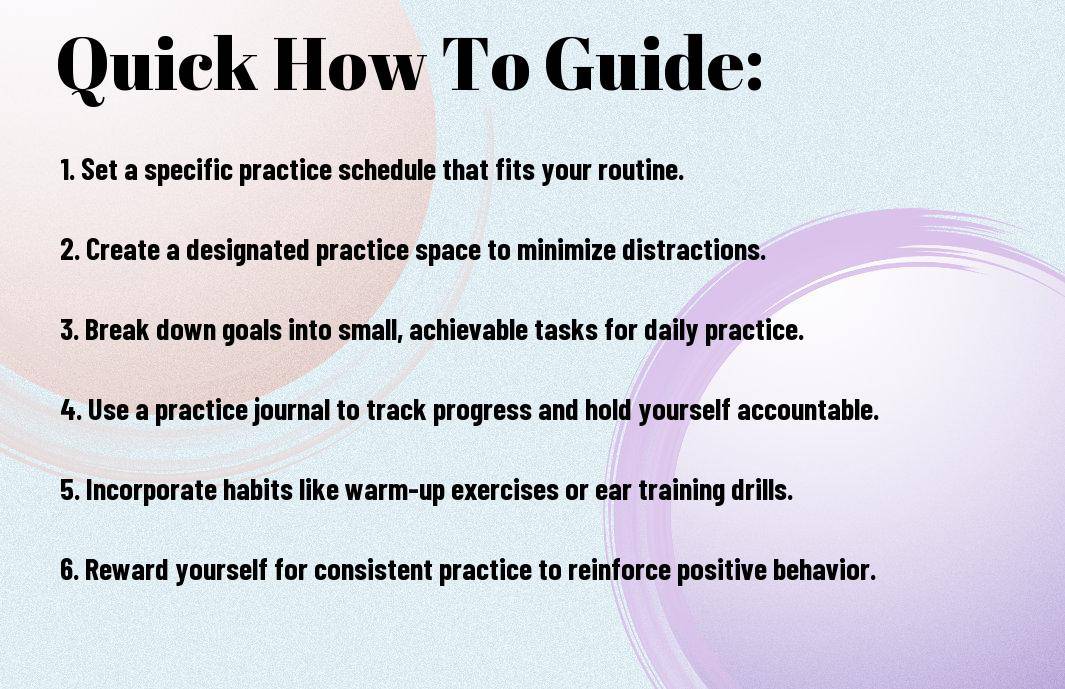Atomic Habits for Musicians
Atomic Habits for Musicians! Consistency is key when it comes to improving as a musician, and developing Atomic Habits can help you practice consistently to reach your full potential. Whether you’re a beginner or an experienced musician, the power of small habits can make a big difference in your progress. By understanding how to apply the principles of Atomic Habits to your music practice, you can establish a routine that will set you up for success.
Key Takeaways:
- Start small: Begin with a small, manageable practice session rather than trying to do too much at once.
- Create a routine: Establish a consistent practice schedule to help make practicing a habit.
- Set specific goals: Define clear and achievable goals for your practice sessions to stay motivated.
- Track your progress: Keep a practice journal or use an app to monitor your improvement over time.
- Eliminate distractions: Find a quiet, dedicated space for practice to minimize interruptions and stay focused.
- Reward yourself: Celebrate small victories and milestones to reinforce the habit of consistent practice.
- Stay committed: Remember that consistency is key, and even short practice sessions can lead to significant progress over time.

Laying the Foundation
Clearly, consistency is key when it comes to mastering an instrument. In the pursuit of musical excellence, establishing strong habits is crucial.
Understanding Atomic Habits
Habits are the small, consistent actions we take daily that lead to significant progress over time. In the context of music practice, it’s not about hours put in at once, but about daily, intentional steps towards improvement. Understanding how habits work can empower musicians to make lasting changes in their practice routines.
The Science of Habit Formation
For musicians, developing a practice routine based on the science of habit formation can be transformative. Research shows that habits are formed through a loop of cue, routine, and reward. By identifying cues that trigger practice sessions, incorporating focused routines, and celebrating small victories, musicians can solidify their commitment to consistent practice.
Understanding that habits are powerful tools that can either propel us forward or hold us back is necessary. By harnessing the science of habit formation, musicians can create a practice routine that is not only sustainable but also enjoyable. Embracing the process of building atomic habits can lead to remarkable growth and mastery in musical skills.
Setting the Stage for Success
Once again, if you are looking to develop the habit of consistent practice as a musician, you might want to explore The Atomic Habit of Practicing Piano. This insightful article can provide you with valuable insights on building a solid foundation for your practice routine.
Creating Your Practice Space
Now, to set yourself up for success, it’s crucial to create a dedicated practice space where you can focus and immerse yourself in your music. This space should be free from distractions and equipped with all the necessary tools and instruments you need. Whether it’s a corner in your room or a designated studio, make sure it’s a place that motivates and inspires you to practice regularly.
Scheduling Your Practice Routine
Some musicians find it helpful to schedule their practice sessions at the same time each day. This consistency helps in forming a habit more effectively. Choose a time that works best for you, whether it’s early morning before the day starts or in the evening after work. Consistency is key when it comes to building a strong practice routine. Set realistic goals for each session and track your progress to stay motivated.
Success in practicing consistently as a musician lies in creating a conducive environment that supports your musical journey. By setting up a dedicated practice space and scheduling your practice routine effectively, you are paving the way for growth and improvement in your musical skills. Note, it’s the small, consistent efforts that lead to significant progress over time.
Small Steps to Big Changes
Many musicians struggle with consistency in their practice routines. The key to making lasting changes in your habits is to start small and gradually build up your practice time. By breaking down your big goals into manageable chunks, you can set yourself up for success and avoid burnout.
Establishing Your Practice Goals
Goals: Start by setting clear and achievable practice goals. Whether you want to improve your technique, learn new songs, or work on a specific skill, make sure your goals are specific, measurable, and realistic. Setting small, attainable goals will help you stay motivated and track your progress along the way.
Breaking Down Complex Skills into Mini Habits
On your journey to becoming a better musician, it’s important to break down complex skills into mini habits. Instead of trying to master a difficult piece all at once, focus on small, daily actions that will gradually build up your skills over time. For example, commit to practicing scales for just five minutes a day, and you’ll be surprised at how much progress you can make in the long run.
Changes: By incorporating these small steps into your daily practice routine, you can make big changes in your overall skill level. Consistency is key, so remember to be patient with yourself and celebrate each small victory along the way. Before you know it, you’ll see a significant improvement in your musical abilities.
Tips to Enhance Your Practice Sessions
After establishing a consistent practice routine, it’s vital to find ways to enhance your sessions and make the most out of your practice time. Here are some tips to take your practice sessions to the next level:
The Role of Mindfulness in Practice
The key to improving your practice sessions lies in mindfulness. By being fully present and engaged in your practice, you can maximize the effectiveness of your efforts. When you practice with focus and intention, you are able to identify areas for improvement and make progress more efficiently.
One way to cultivate mindfulness in your practice is to stay aware of your breath and body while playing. Incorporating meditation and breathing exercises can also help you stay centered and focused during your practice sessions.
Utilizing Technology and Apps
Your practice sessions can benefit greatly from the use of technology and apps designed to enhance musical learning. There are apps available that can help you with ear training, rhythm practice, and even recording tools to track your progress.
Understanding how to effectively use technology and apps in your practice can provide you with instant feedback, customized exercises, and motivational tools to keep you inspired on your musical journey.
The integration of technology and apps not only adds a modern twist to your practice routine but also opens up a world of possibilities for personalized learning and growth.
Overcoming Common Practice Pitfalls
Dealing with Procrastination
With Atomic Habits: Helping Music Students Build the …, you can tackle procrastination head-on. It’s common for musicians to put off practice sessions, especially when faced with challenging pieces or techniques. One effective strategy is to break down your practice into smaller, more manageable tasks. By setting specific, achievable goals for each session, you can reduce the tendency to procrastinate and build momentum in your practice routine.
Maintaining Motivation Through Plateaus
Clearly, staying motivated through plateaus can be tough for musicians. When progress seems slow or stagnant, it’s crucial to stay focused on the long-term benefits of consistent practice. Remember that plateaus are a natural part of the learning process and often indicate that you are on the verge of a breakthrough. Seeking feedback from a teacher or mentor can also help you gain new perspectives and insights to keep you motivated during challenging times.
Pitfalls: Procrastination and plateaus can be significant barriers to consistent practice for musicians. By implementing strategies to tackle procrastination and maintain motivation, you can overcome these common pitfalls and continue to make progress in your musical journey.

Long-term Strategies for Sustained Improvement
The Importance of Reflection and Adaptation
To build a habit of consistent practice as a musician, it is crucial to reflect on your progress and adapt your approach accordingly. All progress is not linear, and there will be ups and downs along the way. To stay motivated and on track, take time to reflect on what is working well and what can be improved. Another great tip is to keep a practice journal where you can jot down your thoughts and observations after each practice session.
How to Measure Progress Effectively
Reflection is key when it comes to measuring progress effectively. Set specific goals for each practice session and track your improvement over time. Another important aspect is to record yourself playing regularly. This allows you to objectively assess your performance and pinpoint areas that need more focus and improvement.
Consistent practice backed by thoughtful reflection and strategic goal-setting will help you achieve long-term success as a musician. Recall, progress takes time, so be patient with yourself and celebrate the small victories along the way!
Conclusion
On the whole, forming atomic habits when it comes to practicing music can significantly impact a musician’s progress and success. By implementing small, consistent changes in your routine, you can cultivate disciplined practice habits that lead to noticeable improvements in your skills over time. For more insights on how to incorporate atomic habits into your practice routine, check out this helpful article on Atomic Habits.
FAQ
Q: Why is practicing consistently important for musicians?
A: Practicing consistently helps musicians improve their skills, build muscle memory, and develop discipline in their craft.
Q: How can atomic habits help musicians with practicing consistently?
A: Atomic habits focus on small, incremental changes that lead to big results over time. By developing small habits around practicing, musicians can make it a regular part of their routine.
Q: What are some examples of atomic habits musicians can incorporate into their practice routine?
A: Setting a specific practice schedule, breaking down practice sessions into smaller chunks, and setting achievable practice goals are all examples of atomic habits musicians can use.
Q: How can musicians stay motivated to practice consistently?
A: Setting up a reward system for consistent practice, tracking progress, and finding a practice buddy or joining a supportive community can help musicians stay motivated.
Q: What should musicians do when they face challenges in practicing consistently?
A: When facing challenges, musicians should reflect on the reasons why they started practicing, adjust their practice goals if necessary, and seek support from mentors or peers.
Q: How long does it take to form a new atomic habit for practicing consistently?
A: It typically takes around 21 days to form a new habit, but the time may vary for each individual. Consistency and perseverance are key to making the habit stick.
Q: Can musicians see improvement in their skills by practicing consistently with atomic habits?
A: Yes, practicing consistently with atomic habits can lead to significant improvement in musicians’ skills over time. The key is to stay committed and make practice a priority in daily life.



